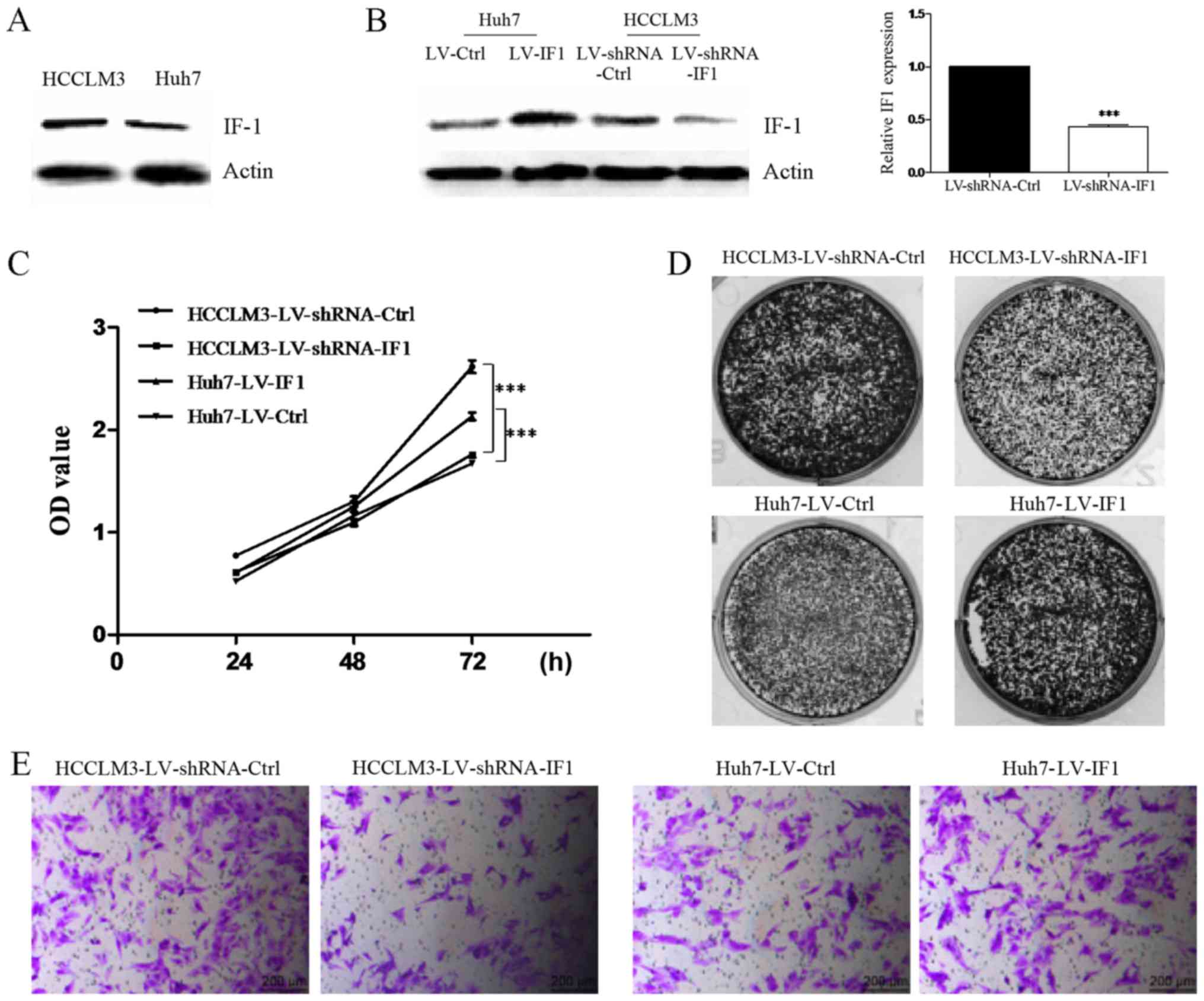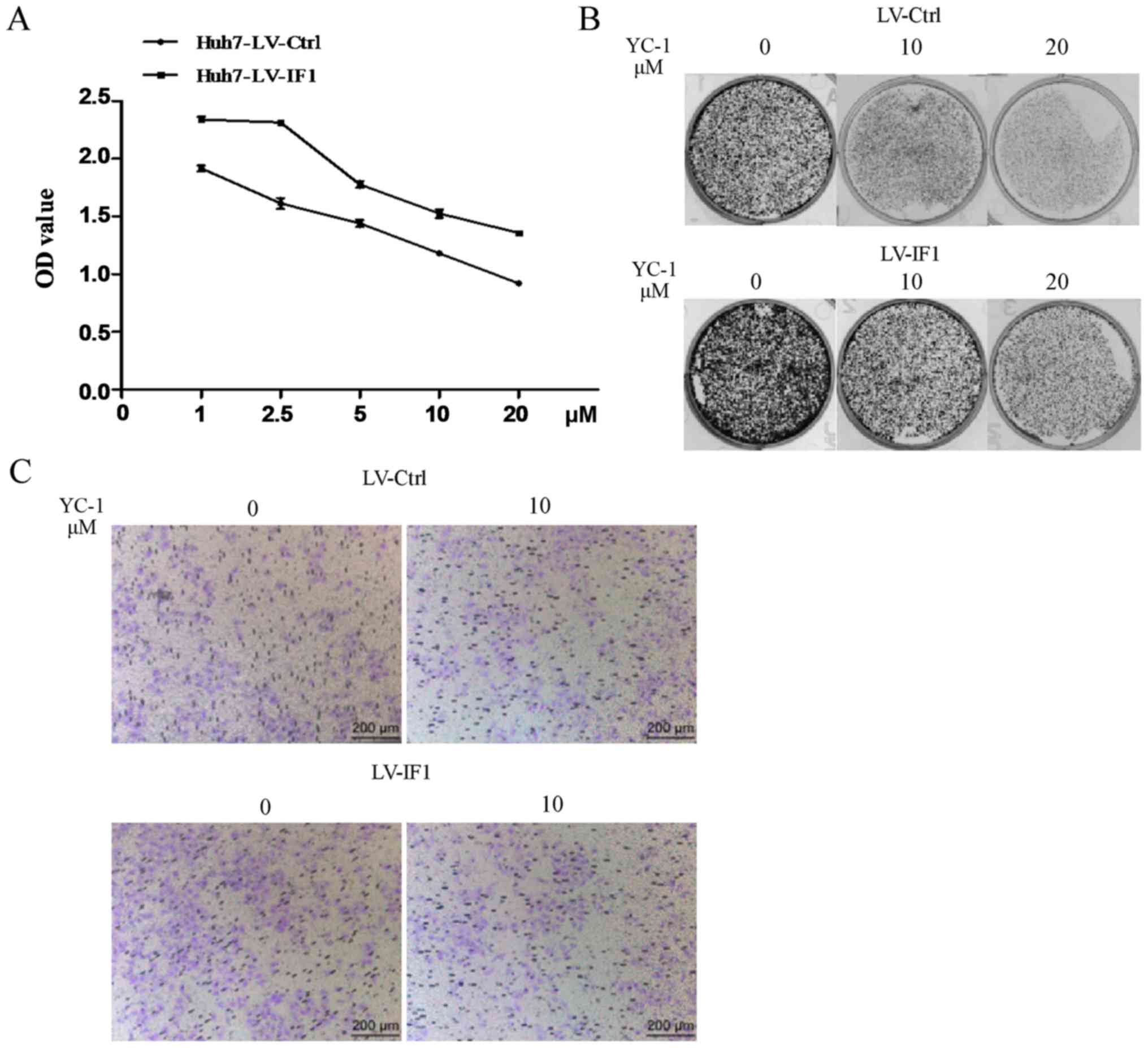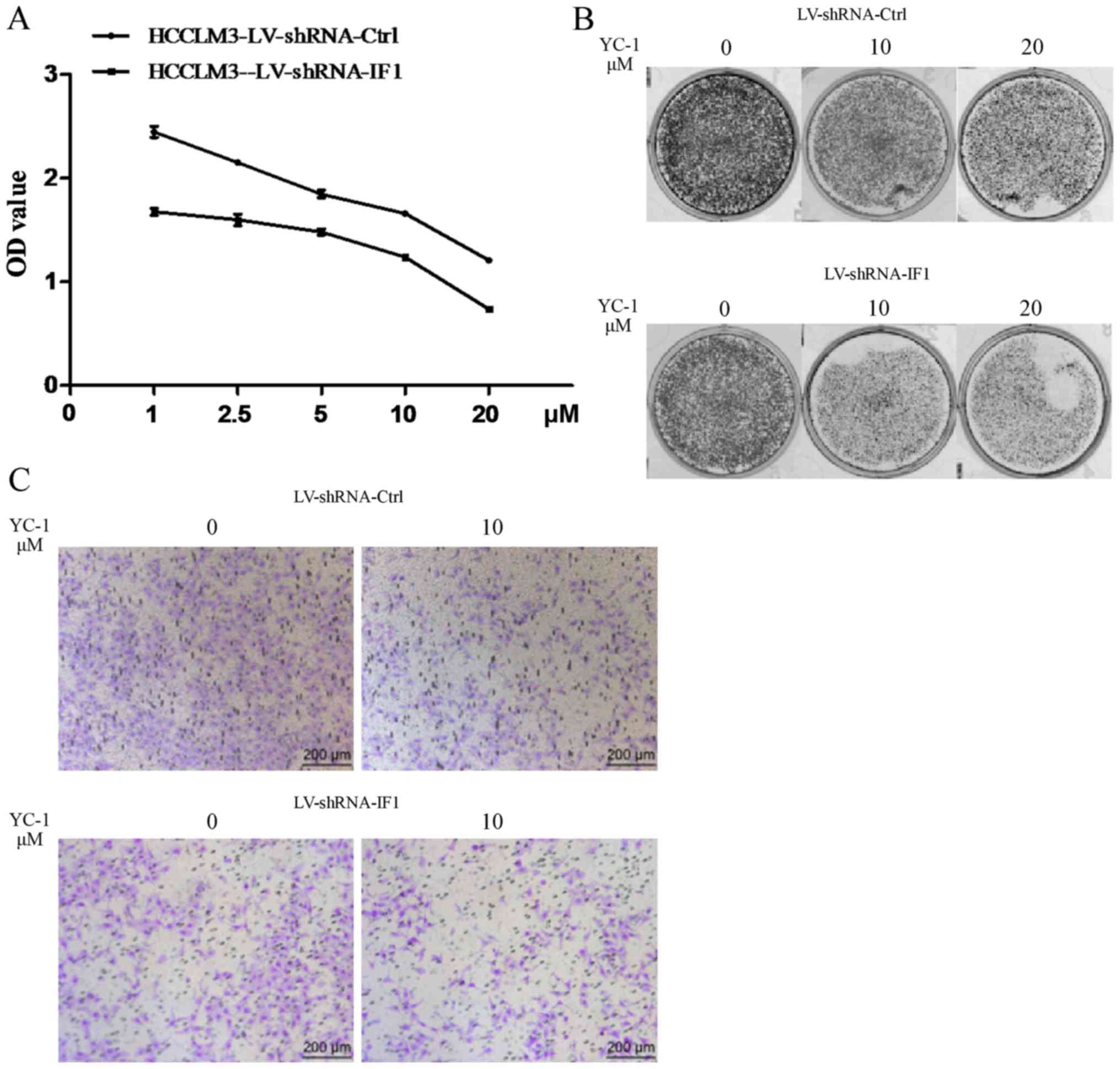|
1
|
Forner A, Llovet JM and Bruix J:
Hepatocellular carcinoma. Lancet. 379:1245–1255. 2012. View Article : Google Scholar : PubMed/NCBI
|
|
2
|
Xu XL, Liu XD, Liang M and Luo BM:
Radiofrequency ablation versus hepatic resection for small
hepatocellular carcinoma: Systematic review of randomized
controlled trials with meta-analysis and trial sequential analysis.
Radiology. 287:461–472. 2018. View Article : Google Scholar : PubMed/NCBI
|
|
3
|
Niu L, Liu L, Yang S, Ren J, Lai PBS and
Chen GG: New insights into sorafenib resistance in hepatocellular
carcinoma: Responsible mechanisms and promising strategies. Biochim
Biophys Acta. 1868:564–570. 2017.PubMed/NCBI
|
|
4
|
Bruix J, Cheng AL, Meinhardt G, Nakajima
K, De Sanctis Y and Llovet J: Prognostic factors and predictors of
sorafenib benefit in patients with hepatocellular carcinoma:
Analysis of two phase III studies. J Hepatol. 67:999–1008. 2017.
View Article : Google Scholar : PubMed/NCBI
|
|
5
|
Chun YS, Yeo EJ and Park JW: Versatile
pharmacological actions of YC-1: Anti-platelet to anticancer.
Cancer Lett. 207:1–7. 2004. View Article : Google Scholar : PubMed/NCBI
|
|
6
|
Yeo EJ, Ryu JH, Chun YS, Cho YS, Jang IJ,
Cho H, Kim J, Kim MS and Park JW: YC-1 induces S cell cycle arrest
and apoptosis by activating checkpoint kinases. Cancer Res.
66:6345–6352. 2006. View Article : Google Scholar : PubMed/NCBI
|
|
7
|
Lau CK, Yang ZF, Lam CT, Tam KH, Poon RT
and Fan ST: Suppression of hypoxia inducible factor-1alpha
(HIF-1alpha) by YC-1 is dependent on murine double minute 2 (Mdm2).
Biochem Biophys Res Commun. 348:1443–1448. 2006. View Article : Google Scholar : PubMed/NCBI
|
|
8
|
Lau CK, Yang ZF, Lam SP, Lam CT, Ngai P,
Tam KH, Poon RT and Fan ST: Inhibition of Stat3 activity by YC-1
enhances chemo-sensitivity in hepatocellular carcinoma. Cancer Biol
Ther. 6:1900–1907. 2007. View Article : Google Scholar : PubMed/NCBI
|
|
9
|
Kong J, Kong F, Gao J, Zhang Q, Dong S, Gu
F, Ke S, Pan B, Shen Q, Sun H, et al: YC-1 enhances the anti-tumor
activity of sorafenib through inhibition of signal transducer and
activator of transcription 3 (STAT3) in hepatocellular carcinoma.
Mol Cancer. 13:72014. View Article : Google Scholar : PubMed/NCBI
|
|
10
|
García-Bermúdez J and Cuezva JM: The
ATPase inhibitory factor 1 (IF1): A master regulator of energy
metabolism and of cell survival. Biochim Biophys Acta.
1857:1167–1182. 2016. View Article : Google Scholar : PubMed/NCBI
|
|
11
|
Garcia-Ledo L, Nuevo-Tapioles C,
Cuevas-Martin C, Martínez-Reyes I, Soldevilla B, González-Llorente
L and Cuezva JM: Overexpression of the ATPase inhibitory factor 1
favors a non-metastatic phenotype in breast cancer. Front Oncol.
7:692017. View Article : Google Scholar : PubMed/NCBI
|
|
12
|
Faccenda D, Nakamura J, Gorini G, Dhoot
GK, Piacentini M, Yoshida M and Campanella M: Control of
mitochondrial remodeling by the ATPase inhibitory factor 1 unveils
a pro-survival relay via OPA1. Cell Rep. 18:1869–1883. 2017.
View Article : Google Scholar : PubMed/NCBI
|
|
13
|
Gao YX, Chen L, Hu XG, Wu HB, Cui YH,
Zhang X, Wang Y, Liu XD and Bian XW: ATPase inhibitory factor 1
expression is an independent prognostic factor in non-small cell
lung cancer. Am J Cancer Res. 6:1141–1148. 2016.PubMed/NCBI
|
|
14
|
Yin T, Lu L, Xiong Z, Wei S and Cui D:
ATPase inhibitory factor 1 is a prognostic marker and contributes
to proliferation and invasion of human gastric cancer cells. Biomed
Pharmacother. 70:90–96. 2015. View Article : Google Scholar : PubMed/NCBI
|
|
15
|
Wei S, Fukuhara H, Kawada C, Kurabayashi
A, Furihata M, Ogura S, Inoue K and Shuin T: Silencing of ATPase
inhibitory factor 1 inhibits cell growth via cell cycle arrest in
bladder cancer. Pathobiology. 82:224–232. 2015. View Article : Google Scholar : PubMed/NCBI
|
|
16
|
Song R, Song H, Liang Y, Yin D, Zhang H,
Zheng T, Wang J, Lu Z, Song X, Pei T, et al: Reciprocal activation
between ATPase inhibitory factor 1 and NF-κB drives hepatocellular
carcinoma angiogenesis and metastasis. Hepatology. 60:1659–1673.
2014. View Article : Google Scholar : PubMed/NCBI
|
|
17
|
Huang LJ, Chuang IC, Dong HP and Yang RC:
Hypoxia-inducible factor 1α regulates the expression of the
mitochondrial ATPase inhibitor protein (IF1) in rat liver. Shock.
36:90–96. 2011. View Article : Google Scholar : PubMed/NCBI
|
|
18
|
Wu J, Shan Q, Li P, Wu Y, Xie J and Wang
X: ATPase inhibitory factor 1 is a potential prognostic marker for
the migration and invasion of glioma. Oncol Lett. 10:2075–2080.
2015. View Article : Google Scholar : PubMed/NCBI
|
|
19
|
Livak KJ and Schmittgen TD: Analysis of
relative gene expression data using real-time quantitative PCR and
the 2(-Delta Delta C(T)) method. Methods. 25:402–408. 2001.
View Article : Google Scholar : PubMed/NCBI
|
|
20
|
Santacatterina F, Sánchez-Cenizo L,
Formentini L, Mobasher MA, Casas E, Rueda CB, Martínez-Reyes I,
Núñez de Arenas C, García-Bermúdez J, Zapata JM, et al:
Down-regulation of oxidative phosphorylation in the liver by
expression of the ATPase inhibitory factor 1 induces a
tumor-promoter metabolic state. Oncotarget. 7:490–508. 2016.
View Article : Google Scholar : PubMed/NCBI
|
|
21
|
Sánchez-Aragó M, Formentini L,
Martinez-Reyes I, García-Bermudez J, Santacatterina F,
Sánchez-Cenizo L, Willers IM, Aldea M, Nájera L, Juarránz A, et al:
Expression, regulation and clinical relevance of the ATPase
inhibitory factor 1 in human cancers. Oncogenesis. 2:e462013.
View Article : Google Scholar : PubMed/NCBI
|
|
22
|
Sánchez-Cenizo L, Formentini L, Aldea M,
Ortega AD, García-Huerta P, Sánchez-Aragó M and Cuezva JM:
Up-regulation of the ATPase inhibitory factor 1 (IF1) of the
mitochondrial H+-ATP synthase in human tumors mediates the
metabolic shift of cancer cells to a Warburg phenotype. J Biol
Chem. 285:25308–25313. 2010. View Article : Google Scholar : PubMed/NCBI
|
|
23
|
Kong J, Kong J, Pan B, Ke S, Dong S, Li X,
Zhou A, Zheng L and Sun WB: Insufficient radiofrequency ablation
promotes angiogenesis of residual hepatocellular carcinoma via
HIF-1α/VEGFA. PLoS One. 7:e372662012. View Article : Google Scholar : PubMed/NCBI
|
|
24
|
Wang SW, Pan SL, Guh JH, Chen HL, Huang
DM, Chang YL, Kuo SC, Lee FY and Teng CM: YC-1
[3-(5′-Hydroxymethyl-2′-furyl)-1-benzyl Indazole] exhibits a novel
antiproliferative effect and arrests the cell cycle in G0-G1 in
human hepatocellular carcinoma cells. J Pharmacol Exp Ther.
312:917–925. 2005. View Article : Google Scholar : PubMed/NCBI
|
|
25
|
Lee CS, Kwak SW, Kim YJ, Lee SA, Park ES,
Myung SC, Kim W, Lee MS and Lee JJ: Guanylate cyclase activator
YC-1 potentiates apoptotic effect of licochalcone A on human
epithelial ovarian carcinoma cells via activation of death receptor
and mitochondrial pathways. Eur J Pharmacol. 683:54–62. 2012.
View Article : Google Scholar : PubMed/NCBI
|
|
26
|
Huynh J, Etemadi N, Hollande F, Ernst M
and Buchert M: The JAK/STAT3 axis: A comprehensive drug target for
solid malignancies. Semin Cancer Biol. 45:13–22. 2017. View Article : Google Scholar : PubMed/NCBI
|
|
27
|
Bixel K, Saini U, Kumar Bid H, Fowler J,
Riley M, Wanner R, Deepa Priya Dorayappan K, Rajendran S, Konishi
I, Matsumura N, et al: Targeting STAT3 by HO3867 induces apoptosis
in ovarian clear cell carcinoma. Int J Cancer. 141:1856–1866. 2017.
View Article : Google Scholar : PubMed/NCBI
|
|
28
|
Khan MW, Saadalla A, Ewida AH, Al-Katranji
K, Al-Saoudi G, Giaccone ZT, Gounari F, Zhang M, Frank DA and
Khazaie K: The STAT3 inhibitor pyrimethamine displays anti-cancer
and immune stimulatory effects in murine models of breast cancer.
Cancer Immunol Immunother. 67:13–23. 2018. View Article : Google Scholar : PubMed/NCBI
|
|
29
|
Zeng R, Tang Y, Zhou H, Liu Y, Huang J, Li
L, Liu W, Feng Y, Zhou Y, Chen T, et al: STAT3 mediates multidrug
resistance of Burkitt lymphoma cells by promoting antioxidant
feedback. Biochem Biophys Res Commun. 488:182–188. 2017. View Article : Google Scholar : PubMed/NCBI
|
|
30
|
Gao P, Niu N, Wei T, Tozawa H, Chen X,
Zhang C, Zhang J, Wada Y, Kapron CM and Liu J: The roles of signal
transducer and activator of transcription factor 3 in tumor
angiogenesis. Oncotarget. 8:69139–69161. 2017.PubMed/NCBI
|
|
31
|
Kim BH, Yi EH and Ye SK: Signal transducer
and activator of transcription 3 as a therapeutic target for cancer
and the tumor microenvironment. Arch Pharm Res. 39:1085–1099. 2016.
View Article : Google Scholar : PubMed/NCBI
|


















